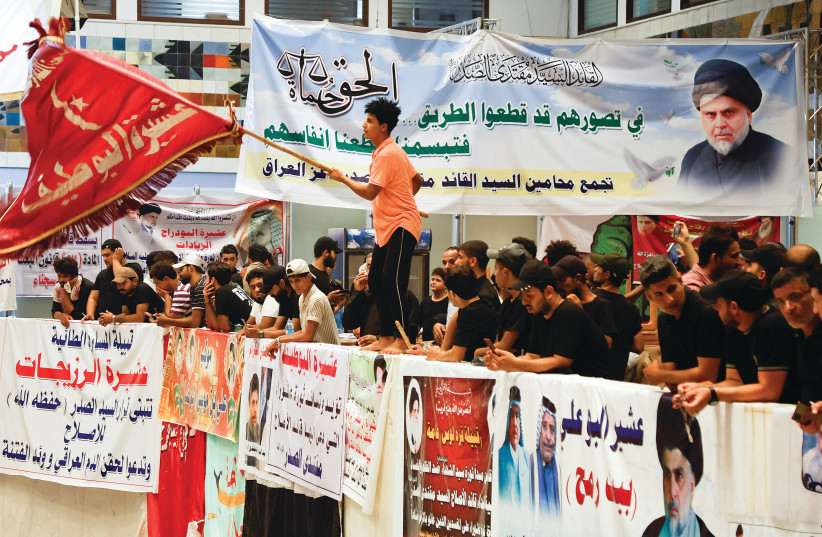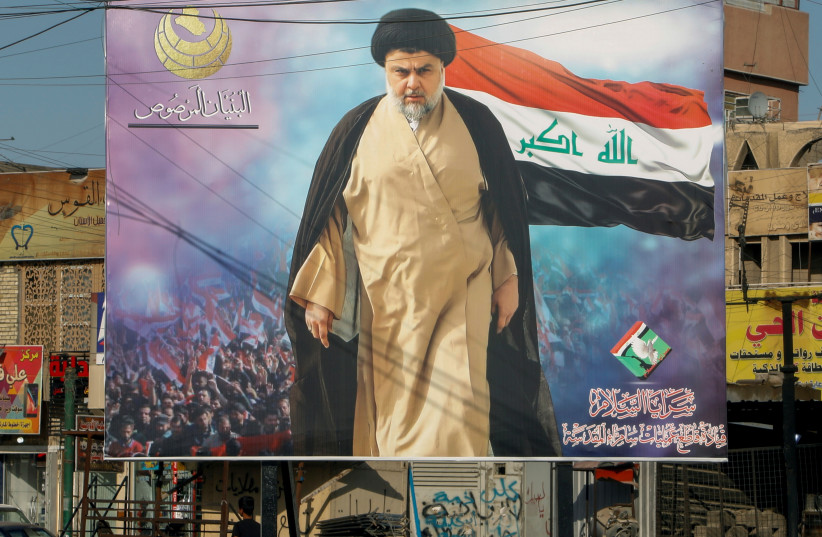BEHIND THE LINES: The possibility of further deterioration remains very real.
Iraq is currently passing through its most tense days since the ISIS war eight years ago.

Protesters associated with the Sadrist trend in Iraq this week began an open-ended sit-in at the Iraqi parliament. The immediate cause of the protests is the deadlock that has gripped the political system since the parliamentary elections held last October.
The Sairoun list, associated with the Shia cleric Muqtada al-Sadr, won the largest number of seats of any list in those elections – 73 in a parliament of 329. Sadr’s followers then set out on a groundbreaking path, seeking to form a government based not on the unity of Shia forces, but rather on a combination of particular elements from among the three main Iraqi communities – Shia and Sunni Arabs and Kurds.
This move was set to exclude the Iran-supported element in Iraqi politics, organized under the name of the “Coordination Framework” following the elections. Poor electoral management had resulted in the parties associated with the Tehran-financed and controlled Shia militias performing very badly in the elections. The State of Law list of pro-Iran former prime minister Nuri al-Maliki picked up some of the lost votes, but overall the pro-Iran element performed badly.
A direct challenge to the Iranian project in Iraq
Sadr has long-standing differences with the regime in Tehran. After October, he set out to form a coalition based on his alliance with the Kurdish Democratic Party of Massoud Barzani, and the Sunni Taqadum list of Muhammad Halbousi.
Sadr’s efforts to build this coalition constituted a direct challenge to the Iranian project in Iraq. Tehran’s method for the takeover of Arab states (in Iraq, Syria and Lebanon, at least; Yemen is a different situation) does not consist of building a revolutionary movement and seeking to topple regimes by revolt. Rather, Iran seeks through the establishment and control of political-military organizations to occupy the state from within, and gradually weaken all elements other than itself.

This point should be noted carefully. A Baghdad-based British diplomat in conversation with this author in 2017 then dismissed my concerns at the Iranian ambition in Iraq, telling me that his embassy wasn’t “worried about Abu Mahdi off playing Che Guevara out in the dust somewhere.”
This formulation is near perfect in its inaccuracy. Abu Mahdi, or his successors, don’t intend to be off in the dust playing any game at all. Rather, for their project to work, they need and intend to be in the government ministries and boardrooms in the capital. Sadr’s effort to exclude the Iran-associated element from the government threatened to keep them away from the vital centers of power and resources.
For this reason, the pro-Iranian elements set out to frustrate Sadr’s effort. They succeeded. Sadr’s inability to muster sufficient numbers in parliament, combined with federal court rulings, prevented him from getting his choice of president or prime minister. It frustrated efforts to form a government and bring together the Sadrists with West-aligned Kurdish and Sunni forces.
Realizing the futility of further efforts, Sadr made the bold decision to order the mass resignation of his parliamentary faction. Street agitation by the Sadrists followed, leading to the current parliamentary sit-in. Sadr’s supporters are seeking to prevent the formation of a rival coalition centered on pro-Iran factions. The announcement by the Coordination Framework of a proposed prime ministerial candidate, Muhammad Shia Sudani, prompted the current protests.
The Sadrist protests: Significant and ominous
SADR’S DECISION to go to the streets is in some ways potentially more significant than the grassroots Shia protests of 2019-20. The latter were an authentic expression of the discontent felt by young Iraqis. The Sadrist protests are more stage-managed, but precisely for this reason they are more ominous. The protesters two years ago were young, unarmed, and defenseless against the authorities, and against the Shia militias, who helped to suppress them.
Sadr’s men, by contrast, are well-armed and have their own extensive knowledge and experience of paramilitary warfare. For that reason, Iraqis are currently deeply concerned about the possibility of violence. Counter protests by the Coordination Framework have been called, though the Badr Organization, the largest and most powerful of the pro-Iran groups, has made clear that it will not be taking part in the protests at this stage. The possibility of clashes remains a real one.
The Sadrists are demanding that parliament be dissolved and new elections held. In the meantime, they want Mustafa al-Kadhimi, the current prime minister, to remain in office. They are also calling for the replacement of a number of federal judges.
Sadr is currently calling on other factions to support what he has referred to as a “spontaneous revolution.” The Coordination Framework, meanwhile, described Sadr’s remarks as “a call for a coup against the people, the state and its institutions.”
Iran’s unique challenges in Iraq
Sadr’s actions illustrate the unique challenges faced by Iran in Iraq as it seeks to cement its ascendancy. Of the four countries in which Iran is seriously engaged (Syria, Iraq, Lebanon and Yemen) two have working parliamentary systems – Iraq and Lebanon. But despite the formal trappings of an elected government, Iran’s ascendancy in Lebanon is near complete, precisely because of the absence of any real potential for street-level resistance to the Iranian design. Since 1990, all potential centers for real resistance to the Iranian advance have been neutralized.
In Iraq, as the events of the last days show, this is not quite the case. Sadr hardly stands for a vision of Iraqi governance that can offer a better future for the inhabitants of that unfortunate country. He may, however, serve as a partial block to the continued consolidation of Iranian control.
In this regard, influential Saudi columnist Tariq al-Homayed, in his July 31 column “The Shia-Shia Conflict” in the Asharq Al-Awsat newspaper, warned that “no one can guarantee that Iran would not resort to violence that targets specific figures to change the rules of the game, just as it did in Lebanon when it assassinated former prime minister Rafik Hariri, marking a pivotal moment in the country.”
“No one can guarantee that Iran would not resort to violence that targets specific figures to change the rules of the game, just as it did in Lebanon when it assassinated former prime minister Rafik Hariri, marking a pivotal moment in the country.”
Tariq al-Homayed
Al-Homayed went on to assert that in the event of an eruption of violence “then all eyes will be turned to the army and security forces that will find themselves obligated to take a stand.”
It is not clear, however, on whose behalf or for what goal the state security forces would intervene, in such circumstances. One should also note that different elements of the security forces are identified with different sides, in this dispute.
The possibility of further deterioration, in any case, remains very real. Iraq is currently passing through its most tense days since the ISIS war eight years ago.